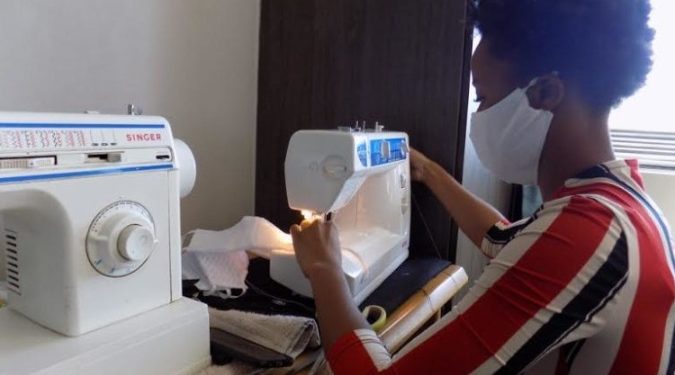Editor’s note: This news column showcases stories from around the world that bring a touch of positivity to the fight against the deadly coronavirus.
WINDHOEK, Namibia-In some spheres of society in Namibia, community members are not adhering to regulations under the COVID-19 state of emergency, which can be detrimental to their health.
“When you visit certain areas, you find people sharing one glass of traditional brew among each other at liquor outlets,” said Helvi Jonas, a community health worker in the Ministry of Health and Social Services on Friday. “Some are neither wearing masks nor social distancing. Hence the need to educate all.”
Jonas is one of the community health workers at the helm of combating COVID-19, based in the Namibian capital, Windhoek.
Community healthcare workers in Namibia are empowering communities at the grassroots level to curb the spread of COVID-19.Interventions include the provision of primary healthcare as well as robust public health education.
When the pandemic broke out in Namibia, the health sector had to shift public healthcare efforts to be inclusive of COVID-19 related matters, Jonas said.
“Our work involves reaching out to residents to bridge the gaps. Lately, we also provide public health education on how people can prevent contracting COVID-19.”
The community health workers also facilitate and promote safety and hygienic practices, which are a necessity in curbing the spread of the virus.
“These entail erecting tippy taps and other sanitation facilities for our community members and making sure that they have running water,” she said.”Hand-washing and proper sanitation are one of the preventive measures.”
Being tested is also given top priority.
However, despite good progress reported, the community healthcare workers face some challenges.
Fear and stigma triggered by COVID-19 are derailing community healthcare workers’ efforts, Jonas said.
Other challenges include inadequate personal protection equipment for community health workers, currently only equipped with masks, which puts them at risk.
“This is limiting because we have patients that tested positive and in isolation at home. We are afraid to attend to them as we do not have the protective gear.”
Kalumbi Shangula, the country’s health minister, recently announced that about 333 health workers in Namibia had been infected with COVID-19.
The pandemic has also limited the primary healthcare that can be delivered.
“We are limited to do other tasks such as weighing babies and inspections.” Members of the public are not allowing healthcare workers to enter their homes, Jonas said.
But even in the face of the challenges, Jonas said it is her passion to drive change to fight COVID-19.
“It is our conviction and commitment to providing robust healthcare and information to address the challenges on behavioral change and adhering to new challenges and the new normal.”
Meanwhile, support by the local development partners complements efforts by community healthcare workers.
Elizabeth Shakujungua, the Khomas regional coordinator for Namibia Red Cross Society, or NRCS, said the institution formed a partnership with the health ministry by performing community engagement activities.
The collaboration has fostered the embedding of community health volunteers and workers in the social environments they work in, Shakujungua said.
Further, NRCS and the ministry have formulated different information material in indigenous languages, distributed countrywide to reach everyone and where the community health workers are.
Locals have commended the role community health workers are playing in the fight against COVID-19.
Absai Kashululu, a national training coordinator at Women Action for Development, said the community health workers are the backbone of society.
“They bring health services to the public directly or in an informative manner, promoting and giving information and helping families and homes. They put their lives on the line even amid the COVID-19 pandemic to save the lives of others,” Kashululu said.









